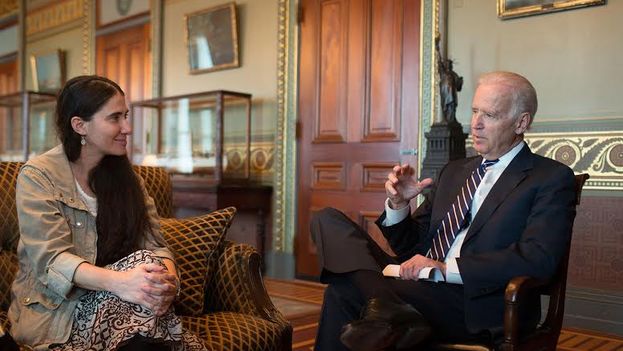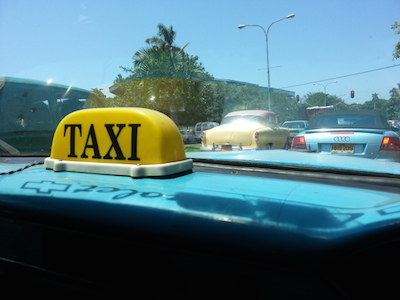14ymedio, Yoani Sánchez, Havana | June 18, 2014 — He has been in power 35 years, he’s the father of the richest woman in Africa, and he has created in Angola one of the most corrupt regimes in the world. His name is Jose Eduardo dos Santos, and he’s visiting Cuba, which helped him to win a war that cost more than two thousand Cuban lives.
Yesterday afternoon the leader of the People’s Movement for the Liberation of Angola (MPLA) arrived in our country, and the government received him as a fellow traveler. A long and bloody military conflict was fought on his territory beginning in 1975, in which more than 377,000 Cuban soldiers participated as well as some 50,000 Cuban civilians. Despite such prolonged and intense contact between the two nations, few on the Island are informed about the situation of this “liberated land” today.
Dos Santos has held the presidency in an authoritarian form, concentrating in his own hands the powers of the president and prime minister, as well as controlling parliament, the judicial system, and the main political party of that African nation. In 2010 a new Constitution was adopted which ended the division of powers and confirmed the president as supreme commander of the armed forces and as the figure who determines the composition of the Supreme Court. continue reading
Angola is torn between the greatest contrasts and the worst tragedies. The misappropriation of public funds and the diversion of state resources are common practices that have allowed many to enrich themselves. The country’s main sources of wealth have become its major sources of problems. Oil, diamonds and uranium, added to its reserves of gold, iron and bauxite, have fueled an entire legion of the corrupt, sheltered under Dos Santos.
Diarrheal diseases, typhoid fever, malaria, tuberculosis and sleeping sickness are rife among the Angolan people, putting the nation on the list of countries at “high risk” with regards to health. Currently, more than four thousand Cubans are serving “missions” in its territory, in areas such as education, construction and healthcare, but this represents barely a drop in the ocean of needs.
HIV also preys on Angolans. Official figures admit to only some 200,000 cases of people suffering from the virus, but its enough to walk the streets and villages to realize the high social impact of this scourge. The mistreatement of women, child slavery, and constant sexual crimes also have a high incidence. Cocaine trafficking and the sale of human beings into servitude are lucrative businesses.
As if this picture weren’t enough, Angola has worrying indices of human rights violations. Limitations on freedom of association and assembly are some of the rights violated, which coincides with the identical practices carried out by the “friendly government” of the Plaza of the Revolution.
However, alarming indicators with regards to health and repression do not deter many Cubans from taking the Angolan route. This time they will fight not in the trenches, but as employees in clinics, businesses and schools. In the African country they receive economic remuneration superior to the low salaries on the Island. The so called “missions” to Angola are much more sought after by medical professionals than are those in Venezuela. They are sold at the highest prices in the “influence market” within the Ministry of Public Health.
Neither the Angolan nor the Cuban national media have reported that the president’s eldest daughter has already passed the barrier of two billion dollars in personal wealth. Isabel dos Santos controls more than 25 percent of the shares in Unitel, one of the country’s two telephone companies. She also participates in businesses in Portugal, where she is said to be the principal shareholder in the country’s largest cable television company. The lack of transparency around power in Luanda, and the people close to the leader, have seized key positions in the national economy.
While her father visits Havana, Isabel dos Santos is in Brazil, where the magazine Veja has published several photos of the Angolan multimillionaire during the inaugural ceremony of the World Cup. According to the publication, some 600 people – among them businessmen and celebrities – have “accommodated” the businesswoman in luxurious rooms in Sao Paule, Rio de Janeiro and Belo Horizonte, to enjoy the football parties and the euphoria of the World Cup.
Stories like these will never be told in the official Cuban press. The families who lost their children in that far off land don’t know what has become of the country where their loved ones fell.




